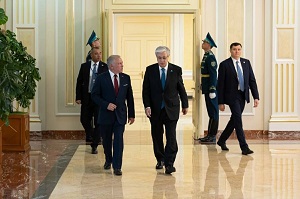Cabinet approves bylaws to regulate gov't committees, evaluate public sector leaders
The Jordan Times
AMMAN — The Cabinet, during a session chaired by Prime Minister Jafar Hassan on Sunday, approved a new bylaw regulating government committees for the year 2025.
The decision is part of ongoing efforts to control public spending, enhance institutional performance, and improve governance across the public sector by regulating the formation and operations of committees and limiting their proliferation, according to a Prime Ministry statement.
Previously, the Cabinet had tasked the Minister of State for Legal Affairs and the Minister of State for Public Sector Modernisation with conducting a comprehensive review of existing government committees, including the allowances granted to their members. Based on the review, recommendations were submitted to the Cabinet to introduce stricter oversight, limit the formation of unnecessary committees and regulate financial compensation based on clear justifications.
The new bylaw establishes a framework that promotes good governance in the formation and functioning of committees within government institutions. It also stipulates that appointments must be based on merit, competence, and relevant expertise.
Under the regulation, committee meetings must be held during official working hours unless the nature of the task requires otherwise. In such cases, prior approval from the relevant authority is required. No financial compensation would be granted for meetings held during regular working hours.
For those conducted outside these hours, compensation is capped at JD100 per month. Such meetings must be justified by specific factors, such as the nature of the task, distance from headquarters, or the need for extended hours.
The regulation also requires committees to submit periodic reports verifying their compliance with the guidelines, and members must declare any potential conflicts of interest related to their committee work.
The Cabinet also approved a new bylaw for the quantitative and qualitative evaluation of top public sector leadership positions, pursuant to Article 6 of Government Leadership Regulation No. 70 of 2024. The new bylaw ensures transparency and equity in determining salaries for high-ranking positions and establishes a unified mechanism for salary structuring.
The evaluation bylaw would apply to new leadership appointments after its enforcement and to existing positions when contracts are renewed or salary increases are proposed.
A specialised committee would assess each position based on a range of indicators, including required skills, the size of the institution in terms of human and financial resources, and the scope of responsibilities. The final salary determination would be subject to Cabinet approval
The new approach replaces the 2023 job evaluation bylaw and is part of broader reforms to enhance public sector efficiency and accountability, according to the statement.
In line with its commitment to institutional reform, the Cabinet approved a new administrative structure for the Ministry of Public Works and Housing. The 2025 regulation aims to improve the Ministry’s ability to carry out its legislative duties, promote transparency, and align its internal structure with the national public sector modernisation roadmap.
The reform also aligns with the Ministry’s 2024–2026 strategic plan, enhancing coordination, decision-making efficiency, and eliminating overlapping responsibilities between departments and directorates.
The Cabinet approved a new administrative regulation for the Orphans Fund Development Foundation, which provides a clear internal structure, defines responsibilities, and streamlines coordination among the Foundation’s various departments to better fulfil its legal mandate.
The Cabinet also endorsed amendments to the internal regulations of the Geologists Association for 2025. These changes, approved earlier by the Association’s general assembly, aim to address a growing financial deficit caused by a mismatch between membership fee revenues and the union’s annual expenditures, the statement read.
The Cabinet approved the reasoning behind proposed amendments to the Traffic Law for 2025, which would be submitted to the Legislation and Opinion Bureau for review. The amendments aim to reduce the legal period a vehicle must remain impounded before it can be sold at public auction, from 24 months to 12 months, allowing authorities to recover costs sooner and avoid depreciation of vehicle value.
Additionally, the amendments would permit the sale of mortgaged or judicially seized vehicles, with creditor or claimant rights transferred to the value of the vehicle after sale. The measure seeks to protect the interests of vehicle owners, creditors, and the government alike.
The Cabinet also accepted the resignation of director general of the Department of Lands and Survey Ahmad Amoush.
Latest News
-
 Houthi prime minister killed in ‘Israeli’ airstrike on Yemen’s Sanaa: reports
Houthi prime minister killed in ‘Israeli’ airstrike on Yemen’s Sanaa: reports
-
 UK bans ‘Israel’ from London arms fair
UK bans ‘Israel’ from London arms fair
-
 Jordan’s trade surplus with US narrows as exports decline
Jordan’s trade surplus with US narrows as exports decline
-
 King, Kazakhstan president attend closing session of Kazakhstan-Jordan Business Forum
King, Kazakhstan president attend closing session of Kazakhstan-Jordan Business Forum
-
 Zelensky says 8 killed in Russian strikes on Kyiv
Zelensky says 8 killed in Russian strikes on Kyiv